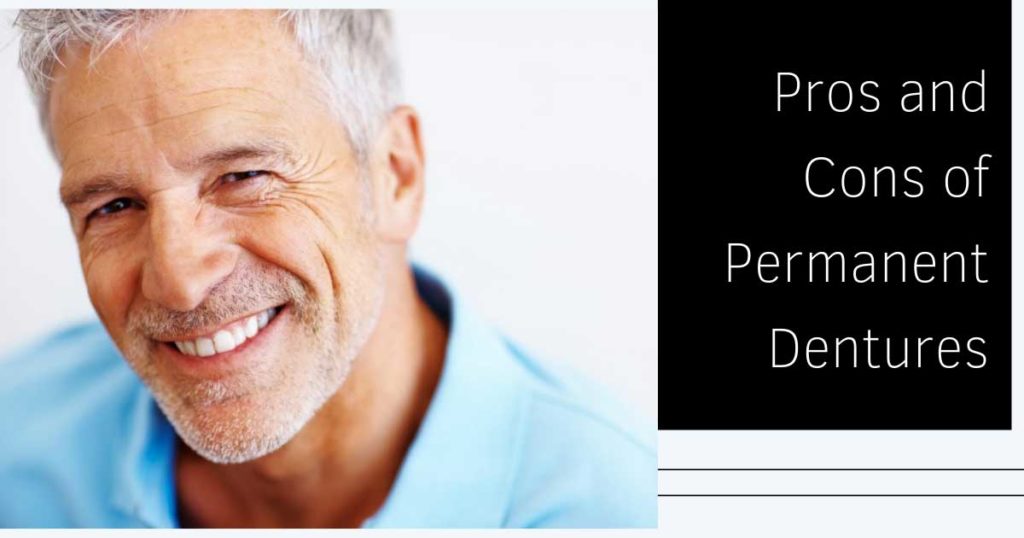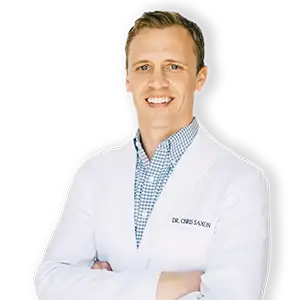
OKC Permanent Denture Methods – Pros and Cons
Are you considering implant-supported dentures? If you’re already a denture wearer or you’re planning to have several teeth extracted, OKC implant-supported dentures are an excellent option for restoring your smile with Saxon Dentistry.
What Are Permanent Dentures?
A “permanent” denture is a hybrid between a conventional denture and a dental bridge. In this case, it’s a streamlined, full-arch prosthesis that’s permanently anchored into the mouth with as few as four dental implants. If you have heard of the All-On-4 dental implant procedure, this is what we mean by as little as 4 implants per arch.
Advantages of OKC Permanent Dentures
Implant-supported permanent dentures are:
• Non-removable
• Comfortable
• Easier to eat and speak with
• Slimmer than a full “plate” style denture
• Can still taste food
• Can last a lifetime
• Prevent facial sagging due to jawbone deterioration
Since there are implants that permanently secure the denture in place, there’s no need for the prosthesis to cover the roof of your mouth. No suction or messy adhesives are required.
Plus, dental implants strengthen the bone around them, helping you prevent the sunken-in features that so often accompany tooth loss.
Permanent Denture Cons
There are really only a couple of disadvantages to permanent dentures. One is that they cost more than a conventional denture upfront. Fortunately, dental implants are typically able to last the rest of your life, as long as you maintain them properly (providing you with the best return on investment.) The reason we say up front is that with conventional dentures, your jaw bone is no longer stimulated and will begin to deteriorate. When this happens, dentures will become loose and most often very irritating to the gums as they will rub more. Patients then come in to get a new set of dentures to accommodate for this bone loss which is costly. New dentures, adhesives, cleaners, etc. will add up over time and can end up costing more than implant-supported dentures.
Second, not everyone qualifies for dental implants. Since it’s necessary to have enough bone to support them, extensive bone loss or disease may contraindicate the placement of an implant. The good news is that since permanent dentures only require 4-6 implants, our OKC implant dentist can adjust where the implants are placed to maximize your current bone density. There are a lot of methods Dr. Saxon can try out before deeming a patient doesn’t qualify for implants.
Permanent vs. Stabilized Dentures
A permanent implant denture is securely anchored onto dental implants and can only be removed by a dentist. However, it should not be confused with another type of hybrid treatment known as an “overdenture” or “stabilized” denture. These dentures look like a typical removable denture. The only difference is that they have special locators underneath them to clip or snap onto a corresponding dental implant. Although they are more secure than a traditional denture, they are not as streamlined or secure as a permanent implant version.
The Ideal Implant Denture Candidate
Implant dentures are great for anyone who needs to replace all of their teeth at once. If your gums and bone are healthy and you qualify for implant treatment, a permanent denture may be the ideal solution for you. Since implants are incredibly durable, you don’t need one for each respective tooth that’s missing. Instead, they act as a set to withstand all of the regular biting forces of an entire arch of teeth.
A Predictable Way to Smile Again
If you’re considering permanent dentures in OKC, contact Saxon Dentistry. We provide personalized implant therapy for all of your missing tooth needs, free dental implant consultations and flexible payment options are available. Call us today to reserve an appointment.

